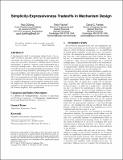Simplicity-Expressiveness Tradeoffs in Mechanism Design
Published Version
https://doi.org/10.1145/1993574.1993632Metadata
Show full item recordCitation
Dütting, Paul, Felix Fischer and David C. Parkes. Forthcoming. Simplicity-Expressiveness Tradeoffs in Mechanism Design. In Proceedings of the 12th ACM Conference on Electronic Commerce, June 5-9, 2011, San Jose, CA.Abstract
A fundamental result in mechanism design theory, the so-called revelation principle, asserts that for many questions concerning the existence of mechanisms with a given outcome one can restrict attention to truthful direct-revelation mechanisms. In practice, however, many mechanisms use a restricted message space. This motivates the study of the tradeoffs involved in choosing simplified mechanisms, which can sometimes bring benefits in precluding bad or promoting good equilibria, and other times impose costs on welfare and revenue. We study the simplicity-expressiveness tradeoff in two representative settings, sponsored search auctions and combinatorial auctions, each being a canonical example for complete information and incomplete information analysis, respectively. We observe that the amount of information available to the agents plays an important role for the tradeoff between simplicity and expressiveness.Terms of Use
This article is made available under the terms and conditions applicable to Open Access Policy Articles, as set forth at http://nrs.harvard.edu/urn-3:HUL.InstRepos:dash.current.terms-of-use#OAPCitable link to this page
http://nrs.harvard.edu/urn-3:HUL.InstRepos:4892934
Collections
- FAS Scholarly Articles [18292]
Contact administrator regarding this item (to report mistakes or request changes)



